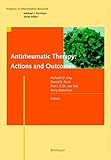Antirheumatic Therapy: Actions and Outcomes [electronic resource] / edited by Richard O. Day, Daniel E. Fürst, Piet L. C. M. van Riel, Barry Bresnihan.
Series: Progress in Inflammation ResearchPublisher: Basel : Birkhäuser Basel, 2005Description: XIII, 343 p. online resourceContent type:- text
- computer
- online resource
- 9783764377267
- 610 23
- R1
 eBooks
eBooks
Medicinal chemistry of the disease modifying anti-rheumatic drugs -- Targeting DMARD therapy -- Pharmacoeconomic properties of disease-modifying antirheumatic drugs -- Future molecular targets -- Hydroxychloroquine -- Sulfasalazine -- Parenteral gold -- Azathioprine -- Methotrexate -- Leflunomide -- Cyclosporin -- Tetracyclines -- Systemic glucocorticoids in rheumatoid arthritis -- TNF-? inhibitors -- Anakinra in rheumatoid arthritis -- Combination therapy -- Hematopoietic stem cell transplantation for the treatment of severe autoimmune diseases.
Our goal for this book is to examine the contemporary therapy of rheumatoid arthritis (RA) from the increasingly important perspective of impact upon quality of life, costs and long-term health outcomes. For too long the focus has been on short term, symptomatic, and surrogate indicator outcomes. Yet RA is a life-long disor der with the majority of impact on an individual patient many years following onset. Further, even in the short-term, researchers and rheumatologists have tended to emphasize measurements of disease activity such as joint counts, ESR and physi cian's opinion as to the amount of disease activity present. It is only relatively recently that measures of structural damage, quality of life and impact on broad domains of health have been given increasing emphasis. Also, the significance of early treatment of RA in order to optimise long-term outcomes has a relatively short history [1]. We have been focussed on the disease processes as surrogates for long term outcomes. Until the short-term process measures are validated as surrogates of long-term effects we should also turn our attention to outcomes of disease and the impact of our management on those outcomes [2). Inour view, this book is especially timely. We are at the dawn of a revolution in the management of RA and other complex immunological inflammatory disorders because their molecular, genetic and environmental mechanisms are being unrav elled. Inthe process, we are revealing a substantial number of novel and significant targets for pharmacotherapy.


